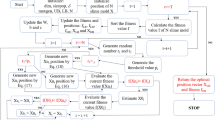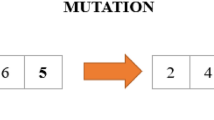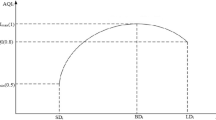Abstract
The concurrent time–cost–quality–CO2 (TCQC) emission trade-off optimization in projects in urban areas is difficult because the factors always contradict each other. This study proposes a hybrid model—slime mold algorithm opposition tournament mutation (SMAOTM)—for TCQC trade-off optimization in three real construction projects in Vietnam. SMAOTM is inspired by the original slime mold algorithm combined with three well-known methods—opposition-based learning, tournament selection, and mutation and crossover—to improve exploration ability, speed up convergence, and reduce local optimization to find optimal results. However, these combinations increase the complexity to process data in the optimization process. The complexity of the actual projects will help to exploit the potential of the proposed model to bring about a successful project implementation solution. Further, to show the efficiency and superiority of SMAOTM, we compared it with well-known previous hybrid models (MOSGO, MODE, MOPSO, NSGA-II, and CAMODE). Based on our results, SMAOTM shows better diversification and convergence and provides a more robust optimal solution than the previous hybrid models.

















































Similar content being viewed by others
Data availability
Enquiries about data availability should be directed to the authors.
References
Abu Arqub O (2017) Adaptation of reproducing kernel algorithm for solving fuzzy Fredholm–Volterra integrodifferential equations. Neural Comput Appl 28:1591–1610. https://doi.org/10.1007/s00521-015-2110-x
Abu Arqub O, Singh J, Maayah B, Alhodaly M (2021a) Reproducing kernel approach for numerical solutions of fuzzy fractional initial value problems under the Mittag–Leffler kernel differential operator. Math Methods Appl Sci. https://doi.org/10.1002/mma.7305
Abu Arqub O, Singh J, Alhodaly M (2021b) Adaptation of kernel functions-based approach with Atangana–Baleanu–Caputo distributed order derivative for solutions of fuzzy fractional Volterra and Fredholm integrodifferential equations. Math Methods Appl Sci. https://doi.org/10.1002/mma.7228
Afshar A, Zolfaghar Dolabi HR (2014) Multi-objective optimization of time-cost-safety using genetic algorithm. Iran Univ Sci Technol 4(4):433–450
Afshar A, Kasaeian Ziaraty A, Kaveh A, Sharifi F (2009) Nondominated archiving multicolony ant algorithm in time-cost trade-off optimization. J Constr Eng Manag 135(7):668–674
Agrawal N, Kumar A, Bajaj V (2017) A new design method for stable iir filters with nearly linear-phase response based on fractional derivative and swarm intelligence. IEEE Trans Emerg Top Comput Intell 1(6):464–477. https://doi.org/10.1109/TETCI.2017.2748151
Agrawal N, Kumar A, Bajaj V (2018) Design of digital IIR filter with low quantization error using hybrid optimization technique. Soft Comput 22:2953–2971. https://doi.org/10.1007/s00500-017-2548-0
Agrawal N, Kumar A, Bajaj V (2019a) A new method for designing of stable digital iir filter using hybrid method. Circuits Syst Signal Process 38:2187–2226. https://doi.org/10.1007/s00034-018-0959-5
Agrawal N, Kumar A, Bajaj V, Singh GK (2019b) Design of bandpass and bandstop infinite impulse response filters using fractional derivative. IEEE Trans Ind Electron 66(2):1285–1295. https://doi.org/10.1109/TIE.2018.2831184
Agrawal N, Kumar A, Bajaj V (2020) Design of infinite impulse response filter using fractional derivative constraints and hybrid particle swarm optimization. Circuits Syst Signal Process 39:6162–6190. https://doi.org/10.1007/s00034-020-01456-0
Agrawal N, Kumar A, Kuldeep B et al (2021) Weighted least square design technique for hilbert transformer using fractional derivative. SIViP 15:1461–1468. https://doi.org/10.1007/s11760-021-01878-6
Ali M, Siarry P, Pant M (2012) An efficient differential evolution based algorithm for solving multi-objective optimization problems. Eur J Oper Res 217(2):404–416. https://doi.org/10.1016/j.ejor.2011.09.025
Alshammari M, Al-Smadi M, Arqub OA, Hashim I, Alias MA (2020) Residual series representation algorithm for solving fuzzy duffing oscillator equations. Symmetry 12:572. https://doi.org/10.3390/sym12040572
Aminbakhsh S, Sonmez R (2016) Discrete particle swarm optimization method for the large-scale discrete time–cost trade-off problem. Expert Syst Appl 51:177–185
Banihashemi SA, Khalilzadeh M (2020) Time-cost-quality-environmental impact trade-off resource-constrained project scheduling problem with DEA approach. Eng Constr Archit Manag 28:1979–2004 (ISSN: 0969-9988)
Cheng MY, Tran DH (2014) two-phase differential evolution for the multiobjective optimization of time–cost tradeoffs in resource-constrained construction projects. IEEE Trans Eng Manag 61(3):450–461
Deb K, Pratap A, Agarwal S, Meyarivan T (2002) A fast and elitist multiobjective genetic algorithm: NSGA-II. IEEE Trans Evol Comput 6(2):182–197. https://doi.org/10.1109/4235.996017
El-Rayes K, Kandil A (2005) Time-cost-quality trade-off analysis for highway construction. J Constr Eng Manag 131(4):477–486
Eshtehardian E, Afshar A, Abbasnia R (2009) Fuzzy-based MOGA approach to stochastic time–cost trade-off problem. Autom Constr 18(5):692–701. https://doi.org/10.1016/j.autcon.2009.02.001
Fang Y, Li J (2010) A review of Tournament Selection in Genetic Programming. Conf Pap. https://doi.org/10.1007/978-3-642-16493-4_19
Farazmand N, Beheshtinia M (2018) Multi objective optimization of time-cost-quality-carbon dioxide emission-plan robustness in construction projects. J Ind Syst Eng 11(3):102–125
Feng C-W, Liu L, Burns SA (1997) Using genetic algorithms to solve construction time–cost trade-off problems. J Comput Civ Eng 11(3):184–189
Gao J, Sun L, Gen M (2008) A hybrid genetic and variable neighborhood descent algorithm for flexible job shop scheduling problems. Comput Oper Res 35:2892–2907
Geem ZW (2010) Multiobjective optimization of time-cost trade-off using harmony search. J Constr Eng Manag 136(6):711–716
Huynh V-H, Nguyen T-H, Pham HC, Huynh T-M-D, Nguyen T-C, Tran D-H (2020) Multiple objective social group optimization for time–cost–quality– carbon dioxide in generalized construction projects. Int J Civ Eng. https://doi.org/10.1007/s40999-020-00581-w
James E, Kelley J, Walker MR (1959) Critical-path planning and scheduling. In: Paper presented at the eastern joint IRE-AIEE-ACM computer conference, Boston, Massachusetts, pp 160–173. https://doi.org/10.1145/1460299.1460318
Kumar A, Agrawal N, Sharma I, Lee S, Lee H-N (2020) Hilbert transform design based on fractional derivatives and swarm optimization. IEEE Trans Cybern 50(5):2311–2320. https://doi.org/10.1109/TCYB.2018.2875540
Leu S-S, Chen A-T, Yang C-H (2001) A GA-based fuzzy optimal model for construction time–cost trade-off. Int J Project Manag 19(1):47–58. https://doi.org/10.1016/S0263-7863(99)00035-6
Leu SS, Hong Son PV, Hong Nhung PT (2015) Optimize negotiation price in construction procurement using Bayesian fuzzy game model. KSCE J Civ Eng 19(6):1566–1572
Li S, Chen H, Wang M et al (2020) Slime mould algorithm: a new method for stochastic optimization. Future Gener Comput Syst. https://doi.org/10.1016/j.future.2020.03.055
Liu S, Tao R, Tam CM (2013) Optimizing cost and CO2 emission for construction projects using particle swarm optimization. Habitat Int 37:155–162. https://doi.org/10.1016/j.habitatint.2011.12.012
Luong D-L, Tran D-H, Nguyen PT (2021) Optimizing multi-mode time-cost-quality trade-off of construction project using opposition multiple objective difference evolution. Int J Constr Manag 21(3):271–283
Monghasemia S, RezaNikoob M, Fasaeeb MAK, Adamowskic J (2015) A novel multi criteria decision making model for optimizing time–cost–quality trade-off problems in construction projects. Expert Syst Appl 42(6):3089–3104
Munglea S, LyesBenyoucef Y-J, Tiwaric MK (2013) A fuzzy clustering-based genetic algorithm approach for time–cost–quality trade-off problems: a case study of highway construction project. Eng Appl Artif Intell 26(8):1953–1966
Panwar A, Jha KN (2021) Integrating quality and safety in construction scheduling time-cost trade-off model. J Constr Eng Manag. https://doi.org/10.1061/(ASCE)CO.1943-7862.0001979
Senouci AB, Mubarak SA (2016) Multiobjective optimization model for scheduling of construction projects under extreme weather. J Civ Eng Manag 22(3):373–381. https://doi.org/10.3846/13923730.2014.897968
Sharma K, Trivedi MK (2020) Latin hypercube sampling-based NSGA-III optimization model for multimode resource constrained time–cost–quality–safety trade-off in construction projects. Int J Constr Manag. https://doi.org/10.1080/15623599.2020.1843769
Son PVH, Hieu HT (2021) Logistics model for precast concrete components using novel hybrid ant lion optimizer (ALO) algorithm. Int J Constr Manag 23:1560–1570
Son PVH, Khoi TT (2020) Development of Africa wild dog optimization algorithm for optimize freight coordination for decreasing greenhouse gases. ICSCEA 2019:881–889
Son PVH, Khoi LNQ (2022) Utilizing artificial intelligence to solving time–cost–quality trade-off problem. Sci Rep 12:20112. https://doi.org/10.1038/s41598-022-24668-7
Son PVH, Khoi LNQ (2023) Building projects with time–cost–quality–environment trade-off optimization using adaptive selection slime mold algorithm. Asian J Civ Eng. https://doi.org/10.1007/s42107-023-00572-x
Son PVH, Lien PN (2022) Blockchain crowdsourced arbitration in construction project delay resolution. J Sci Technol Civ Eng STCE HUCE 16:100–115
Son PVH, Duy NHC, Dat PT (2021) Optimization of construction material cost through logistics planning model of dragonfly algorithm—particle swarm optimization. KSCE J Civ Eng 25(7):2350–2359
Sung L, Cheng X, Liang Y (2010) Solving job shop scheduling problem using genetic algorithm with penalty function. Int J Intell Inf Process 1(2):65–77
Tiwari S, Johari S (2015) Project scheduling by integration of time cost tradeoff and constrained resource scheduling. J Inst Eng India Ser A 96(1):37–46
Tizhoosh HR (2005) Opposition-based learning: a new scheme for machine intelligence. In: International conference on computational intelligence for modelling, control and automation and international conference on intelligent agents, web technologies and internet commerce (CIMCA-IAWTIC’06), pp 695–701
Tran D-H, Luong-Duc L, Duong M-T, Le T-N, Pham A-D (2018) Opposition multiple objective symbiotic organisms search (OMOSOS) for time, cost, quality and work continuity. J Comput Des Eng 5(2):160–172. https://doi.org/10.1016/j.jcde.2017.11.008
Vu-Hong-Son P, Ton-Dat P, Huynh-Chi-Duy N (2022) Optimization of project scheduling under constrained resources using the dependency structure matrix and whale algorithm. Journal of Technology 37(1):1–16
Wang T, Abdallah M, Clevenger C, Monghasemi S (2019) Time–cost–quality trade-off analysis for planning construction projects. Eng Constr Archit Manag 28:82–100 (ISSN: 0969-9988)
Xua J, Zheng H, Zeng Z, Wud S, Shend M (2012) Discrete time–cost–environment trade-off problem for large-scale construction systems with multiple modes under fuzzy uncertainty and its application to Jinping-II hydroelectric project. Int J Project Manag 30(8):950–966
Zahraie B, Tavakolan M (2009) Stochastic time-costresource utilization optimization using nondominated sorting genetic algorithm and discrete fuzzy sets. J Constr Eng Manag 135(11):1162–1171
Zheng H (2016) The bi-level optimization research for time-cost-quality-environment trade-off scheduling problem and its application to a construction project. In: Proceedings of the tenth international conference on management science and engineering management, pp 745–753
Zitzler E, Thiele L, Laumanns M, Fonseca CM, Fonseca VGd (2003) Performance assessment of multiobjective optimizers: an analysis and review. Trans Evol Comput 7(2):117–132. https://doi.org/10.1109/tevc.2003.810758
Acknowledgements
For this work, we gratefully recognize the time and facilities provided by Ho Chi Minh City University of Technology (HCMUT), VNU-HCM.
Funding
The authors have not disclosed any funding.
Author information
Authors and Affiliations
Corresponding author
Ethics declarations
Competing interests
All authors state that this research is not funded and non-financial conflicts of interest in this manuscript.
Additional information
Publisher's Note
Springer Nature remains neutral with regard to jurisdictional claims in published maps and institutional affiliations.
Rights and permissions
Springer Nature or its licensor (e.g. a society or other partner) holds exclusive rights to this article under a publishing agreement with the author(s) or other rightsholder(s); author self-archiving of the accepted manuscript version of this article is solely governed by the terms of such publishing agreement and applicable law.
About this article
Cite this article
Son, P.V.H., Khoi, L.N.Q. Time–cost–quality–CO2 emissions optimization in construction management using slime mold algorithm opposition tournament mutation. Soft Comput 27, 12071–12098 (2023). https://doi.org/10.1007/s00500-023-08387-3
Accepted:
Published:
Issue Date:
DOI: https://doi.org/10.1007/s00500-023-08387-3




